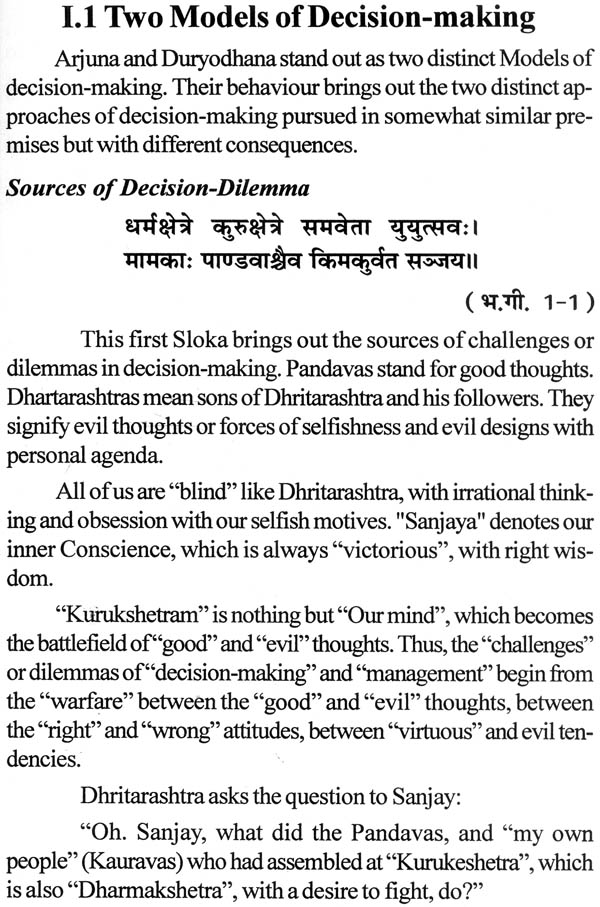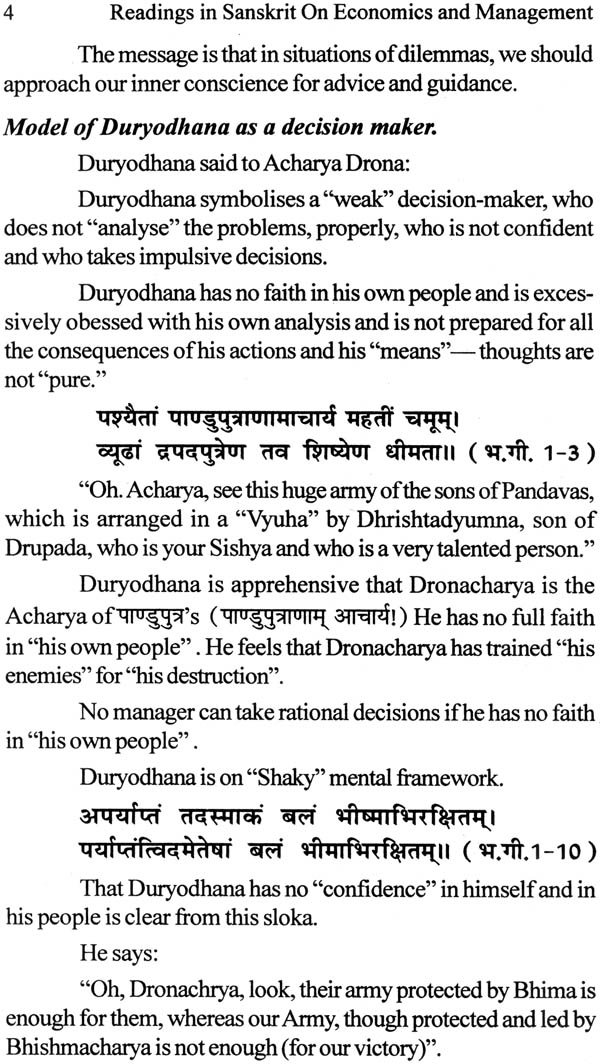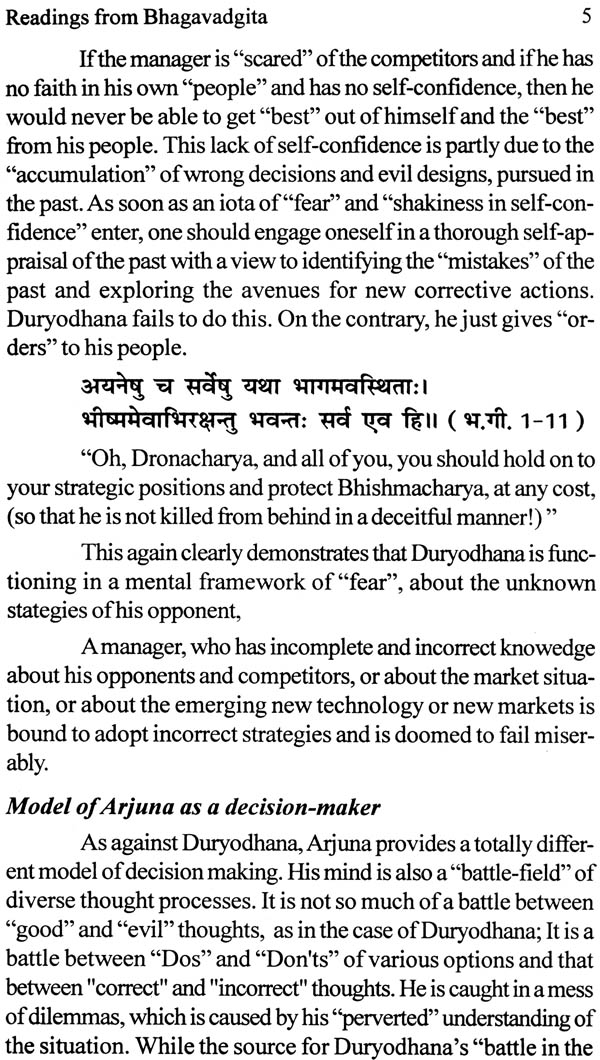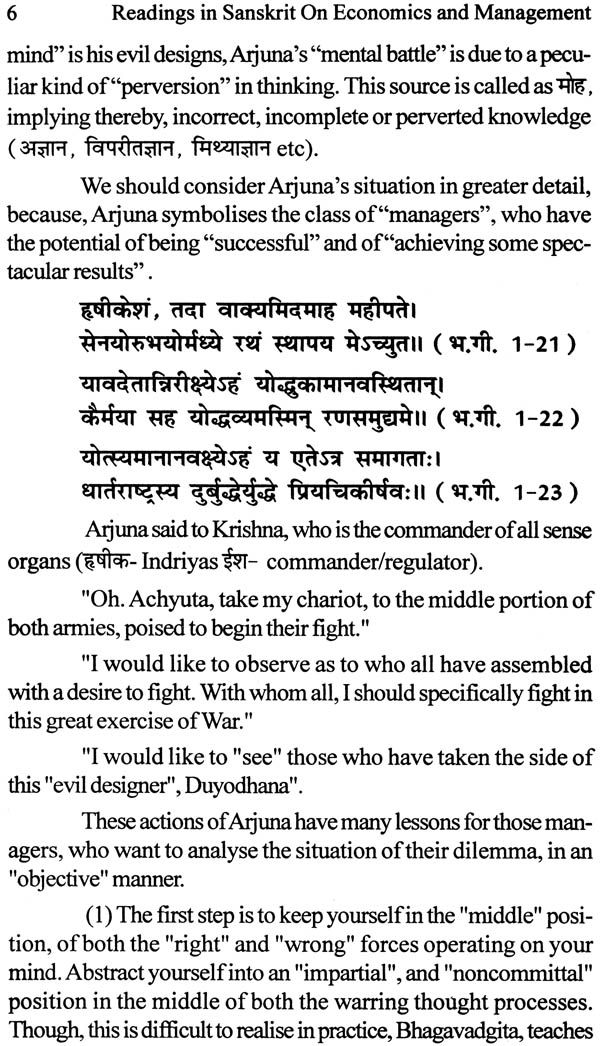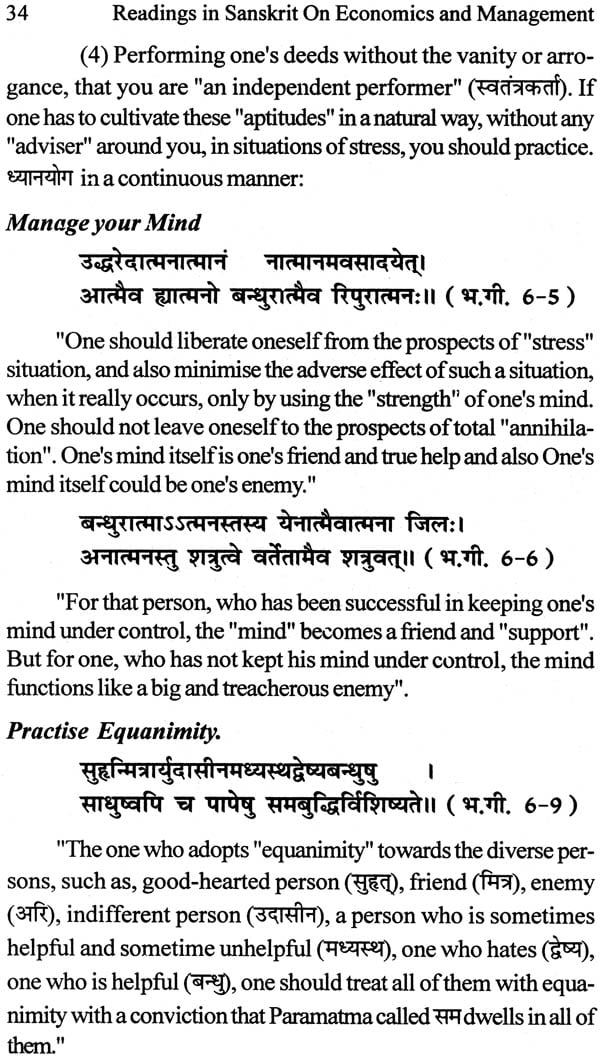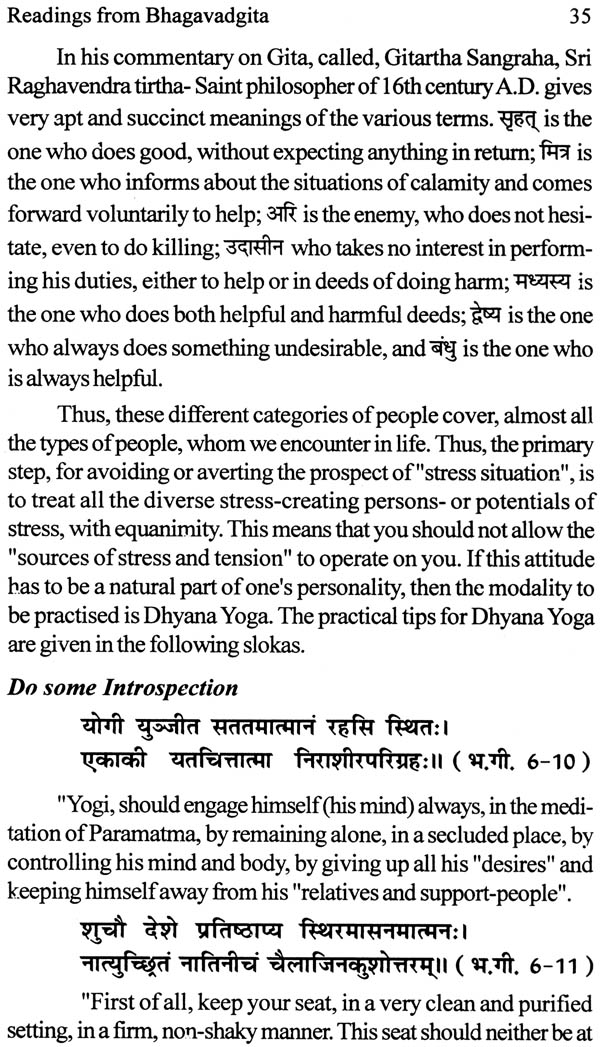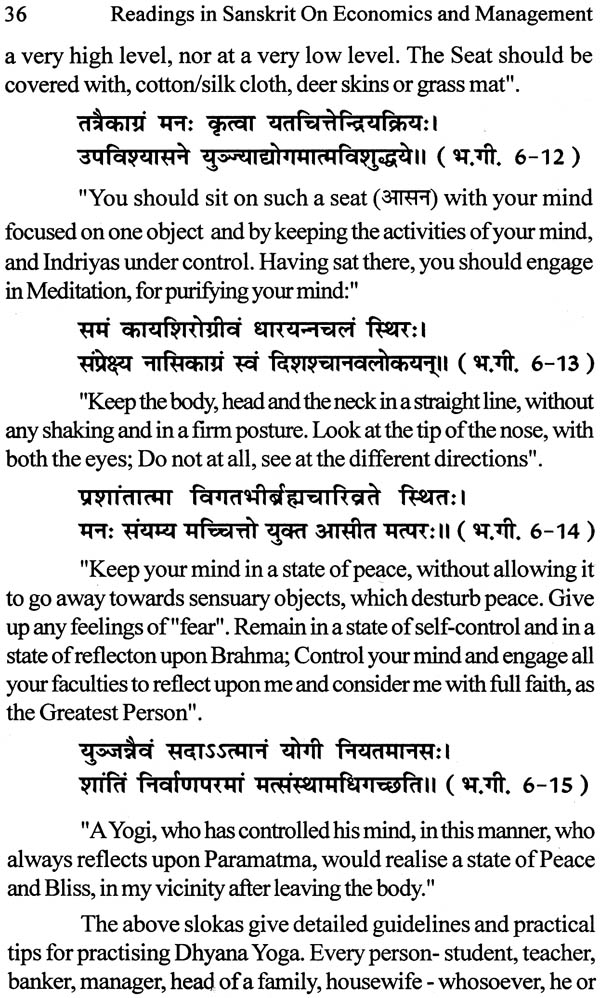
Readings in Sanskrit on Economics and Management
Book Specification
| Item Code: | NAM217 |
| Author: | V. R. Panchamukhi |
| Publisher: | Rashtriya Sanskrit Sansthan, Janakpuri |
| Language: | Sanskrit and English |
| Edition: | 2012 |
| ISBN: | 9789386111883 |
| Pages: | 210 |
| Cover: | Hardcover |
| Other Details | 9.0 inch X 6.0 inch |
| Weight | 370 gm |
Book Description
In this Volume of Readings, we could cover some excerpts from ancient Sanskrit literature, viz. Bhagavadgita, Ramayana, Mahabharata, Kautily’s Arthsastra and Krishiparasara. We are aware that many more sources should be covered. It is proposed to cover them in the subsequent Volumes of similar nature.
The purpose of these select portions of Sanskrit texts is to give to the readers, a flavor of the profound wisdom contained in the Sanskrit Literature and to inspire the students and teachers of economics and management to look towards our profound indigenous source of knowledge, for suitable innovative ideas for forcing a paradigm shift in the process of development and management in the century.
Dr. V.R.Panchamukhi M.A. Ph.D Dr. V.R.Panchamukhi is a well known Scholar, in two field, Economics and Sanskrit-a rare combination. He has had his trainings in Sanskrit and Shastras, at the feet of his revered father, Vidyarama, Sri R.S.Panchamukhi as his Guru. He is Chancellor’s Gold Medalist of Bombay University. He has M.A. degree in Statistics and Ph.d. Degree from Delhi University in Economics. He has held several important positions, such as, Chairman, Indian Council of Social Science Research, (Ministry of Human Resource Development), Director General, Research of nand information System (Ministry of External Affairs), Chancellor, Rashtriya Sanskrit Vidyapeeth (Deemed University), Tirupati (Ministry of HRD, New Delhi), Board Member, Tirumala Tirupati Devasthanams Trust, Tirupati. He is currently, Chancellor, Sri Gurusarvarbhouma Sanskrit Vidyapeeth, Mantralayam. He has taught Economics in Bombay and Delhi University for more than two decades. He has authored Books in Sanskrit on Economics and contemporary Issues to demonstrate that Sanskrit is a living language. His Books include, among others, Bharatiyam Artha Sastram, Bharatasya Arthika Sarvekshanma, Kavya Kusuma Stabakah (Collection of this Sanskrit Poems), Brahma Sutras-English translation and Notes. Ancient Indian Thoughts on Development and Management, Human Science in Indian Heritage. He is recipient of President Certificate of Honour for Sanskrit and the Honoris Cause title “Vachaspati” from Sri Lal Bhadur Shastri Sanskrit Conference, 2012, Dr. Panchamukhi, was honoured with an honoris cause title of Visishta Sanskrit Sewa Vrati.
One of the basic objectives of the work programme of the Rashtriya Sanskrit Sansthan has been to bring Sanskrit to the mainstream of learning, not only in the field of its learning as a language but also in the context of demonstrating the relevance of the rich contributions of the Sanskrit literature, to the diverse aspects of our contemporary lives. Recent research on Sanskrit literature has brought out the richness of its contributions to the diverse disciplines of Physical and Social Sciences.
It is our belief that the theory and practice, advocated in our ancient Sanskrit Literature, in regard to the fields of Economics and Management, are very useful in evolving new paradigms of development and governance that would ensure realization of optimum social welfare, in the contemporary world also. We are also of the view that the students of economics and management in our Institutions of modern formal education should study Sanskrit and thereby become aware of the thoughts contained in the Sanskrit Literature from the original sources. Further, it is useful if the students of Sanskrit could expand their horizon of learning by understanding the relevance of the wisdom contained in the Sanskrit literature to the contemporary world. Both these processes would be useful in enhancing the extent of respect for Sanskrit, in addition to the goal of identifying new innovative solutions to the complex dilemmas of the modern complex world.
It is with the above said purposes in mind that we had requested Dr. V.R.Panchamukhi, a well known unique expert in the fields of both Sanskrit and economics, to prepare a Book of Readings in Sanskrit on Economics and Management, to be published by Rashtriya Sanskrit Sansthan. We are grateful to Dr. Panchamukhi, for having produced a very useful Volume on the selected Theme.
We have plans to continue this Series as Applied Sanskrit Learning Series, by bringing out more of such Volumes in the different fields, such as, Physical Sciences, Social Sciences, Management and Law.
We recall with a feeling of appreciation and gratitude, that Dr. Panchamukhi had prepared, earlier, for Rashtriya Sanskrit Sansthan, a unique Book, entitled, Bharatiyam Arthsastram in Sanskrit, (published in Bharata-Svatantrya-Svarna-Jayanti Granthamala of Rashtriya Sanskrit Sansthan), which presented the ancient and contemporary Economic thoughts in Sanskrit, with a view to demonstrating that Sanskrit is a living language, capable of presenting the analysis of the contemporary issues in Chaste Sanskrit, which can be understood by common people. We may mention that Dr. V.R.Panchamukhi had also brought out “The Economic Survey of India”, in Sanskrit, (Bharatasya Arthikam Sarvekshanam) as a publication of Rashtriya Sanskrit University, Tirupati.
Dr. Y.R.Panchamukhi is the recipient of the prestigious Certificate of Honour in Sanskrit and also the honoris causa title of Vachaspati, from Sri Lal Bahadur Shastri Sanskrit University, New Delhi.
We hope that this Volume would be taken up by the modern Institutions of Economics and Management as also by the traditional Sanskrit Vidyapeethas, as a useful reference Book for study and teaching.
Sanskrit is a rich language and is one of the most ancient languages of the world. It is now commonly accepted that Sanskrit is the mother of many Indian and European languages. What makes Sanskrit language, the most respectable one is the fact that the literature in Sanskrit is the rich reservoir of profound Knowledge about the different disciplines of physical and social sciences, in addition to containing perceptive thoughts of Philosophy and Metaphysics. Unfortunately, in the recent centuries, Sanskrit has been considered only as a language meant for rituals and religious practices. This situation has arisen because, we have lost touch with the language as also with its rich literature. What ever be the causes for this pathetic status of Sanskrit, in the recent times, it is gratifying to find that some new initiatives are being taken, both at the governmental level and in the non-governmental circles, to restore to Sanskrit, its pristine status in the intellectual space of India.
It is my firm view that the respectability and acceptability of Sanskrit in the contemporary world, can be enhanced only when, the relevance of the wisdom and knowledge contained in the Sanskrit literature for resolving many challenging dilemmas of the present day society, are clearly brought out and eloquently advocated. There is a very peculiar problem of communication-gap, between the Sanskrit world and the modern world of economics and management. Further there is also a big space of ignorance in the Sanskrit World and in the world of modern formal education.
In many fora, wherever, I had had the opportunities of delivering lectures on Economics, Management and Sanskrit, I have been making the suggestion that the students of modem Institutions in Economics, Management, and Science, should learn Sanskrit and study the relevant portions from Sanskrit Literature, so as to acquaint themselves with the wisdom available the Sanskrit Literature, pertaining to these subjects. Further, I have been mentioning in the Sanskrit world that the traditional Sanskrit teachers and students should study the modern subjects and bring out the propositions made in the Sanskrit Literature in the language and the jargons of the modern learning processes. The question was one of having appropriate teaching materials on Economics, Sciences and Management. I fully commend the initiative taken by the Rashtriya Sanskrit Sansthan, New Delhi for bringing out a series of publications on such Readings pertaining to the diverse fields of Physical and Social Sciences, with a view to bridging the aforesaid gap, in access to knowledge.
I am aware that the present Book is only a very modest attempt to bridge the aforesaid gap. Many more source books and many more themes need to be covered to bring out fully the wisdom of the Sanskrit Literature, as is useful to the contemporary world. It is my ambition to make many more Volumes of Readings in this direction.
Today the process of economic development and the practice of management have reached a new phase of crisis, which have necessitated rethinking in regard to the choice of appropriate paradigms of development and governance, which would be useful for realization of optimum welfare of the common Man. Contemporary Economic Science perceives Man as a rational Economic Man, whereas our Sanskrit-wisdom conceives Man as a holistic entity with a blend of both the materialistic and spiritual dimensions of life. It is argued in the heritage wisdom of India that the concept of development should be embellished with "Values" of contentment, sacrifice, caring, compassion, cooperation etc. and that growth of GDP alone is not development. Our heritage wisdom keeps the welfare of the mankind at the focus of the goals and strategies. The present-day Paradigm of development based on the principles of Globalization, Privatisation and Liberalisation, has encouraged the approach of excessive consumerism and highly capital-centric stractegy of development, resulting in a highly distorted structure of development, which cannot be sustained in the long run.
The modern strategy of development has encouraged widening of gap between the rich and the poor and denounced the goals of employment expansion. The Indian heritage wisdom of development gives emphasis on equitable growth with fullest utilization of human resources. The Heritage wisdom gives emphasis on the approach of Managing Oneself in contrast to the approach of managing others advocated in the modern management science.
In this Volume of Readings, we could cover some excerpts from ancient Sanskrit literature, viz. Bhagavadgita, Ramayana, Mahabharata, Kautily's Arthsastra and Krishiparasara. We are aware that many more sources should be covered. It is proposed to cover them in the subsequent Volumes of similar nature.
The select materials from Bhagavadgita are used to present a profile of managing oneself and to discuss the modalities of tackling the situations of stress and decision-dilemmas. The theory and practice of human behavior as advocated here are conceived to provide a framework for optimum efficiency and social welfare. We argue that the present crisis situation in the country is because we are not using the messages of Bhagavadgita in a suitable way for bringing about a strong motivated societal structure with focus on Values of Life.
In Ramayana, we have presented the attributes of Ramachandra as the characteristics of an Ideal Leader. The various inputs available from the Katchit Sarga (100th Sarga in Ayodhya Kanda) are presented to discuss the contours of an efficient system of governance.
In Mahabharata, the wellknown conversation between Bhishmacharya and Yudhishthira is used to spell out the contours of evolving a Value-based governance system, with focus on the performance of duties and fulfillment of responsibilities by every one.
We have derived lot of material from Kautilya's Arthsastra to deal with the various issues of non-corrupt administration, or- ganized system of governance and the duties and rights of the various groups of people in the society.
Finally, we have presented excerpts from Krishiparashar, with the objective of advocating the thesis that the agricultural sector has always received high priority attention in our system and that the recent neglect of agriculture is not justified.
The purpose of these select portions of Sanskrit texts is to give to the readers, a flavor of the profound wisdom contained in the Sanskrit Literature and to inspire the students and teachers of economics and management to look towards our profound indigenous sources of knowledge, for suitable innovative ideas for forcing a paradigm shift in the process of development and management in the country.
I would like to express my gratitude to Rashtriya Sanskrit Sansthan, in particular, to Dr. Radhavallabh Tripathi, its Vice- Chancellor, for giving me this unique opportunity of producing this interesting Volume.
The support and understanding, shown by Dr. Radhavallabh Tripathi, Vice-Chancellor, Rashtriya Sanskrit Sansthan, have played a very important role in my ability to complete my task, despite some delays.
I would like to place on record, with appreciation and gratitude, the valuable services rendered by Sri Hiralal, of Amar Printing Press for his painstaking efforts in bringing out this Volume in an elegant manner, in a short time.
I hope this Volume would be found useful for all those, interested in the subject.
| Part I | Readings From Bhagavadgita | 1-52 | |
| 1.1. | Two Models of Decision-Making; | 3 | |
| 1.2. | A Good Manager Approaches a Senior Adviser; | 11 | |
| 1.3. | A Theory of Work -Culture; | 19 | |
| 1.4. | Managing One-Self: The Primary Role in Management; | 23 | |
| 1.5. | Who is an "Ideal" Leader? | 29 | |
| 1.6. | How to Control Stress? | 33 | |
| 1.7. | Classification of Assets: Daivi Sampat and Asuri Sampat; | 39 | |
| 1.8. | The Art and Technique a of Dialogue; | 45 | |
| Part II | Readings From Ramayana | 53-77 | |
| II.1. | Attributes of An Ideal Leader; | 55 | |
| II.2. | Principles of Good Governance; | 62 | |
| II.3. | Discard the Fourteen Rajadoshas; | 76 | |
| Part III |
| 79-124 | |
| III.1. | Introduction; | 81 | |
| III.2. | Principles For the Ruler; | 83 | |
| III.3. | Choice of Ministers, Secretaries and Advisers; | 87 | |
| III.4. | Importance of Consultations; | 91 | |
| III.5. | Testing the Integrity of the Officers; | 95 | |
| III.6. | Drafting the "Laws" and "Contracts"; | 101 | |
| III.7. | Modalities for Negotiations and Dialogues; | 105 | |
| III.8. | Seven Layers of the State and the Principles of Governance; | 107 | |
| III.9. | The routine and the role of the king: | 110 | |
| III.10. | Sectors of the Nation for Governance; | 113 | |
| III.11. | Select Proverbial Statements found in Arthashastra; | 120 | |
| Part IV | Readings from Mahabharata | 125-144 | |
| IV.1. | Introduction; | 127 | |
| IV.2. | Excerpts on Rajadharma; | 129 | |
| IV.3. | History of the System of Monarchy and Governance; | 134 | |
| IV.4. | Duties, Rights and Social Harmony; | 139 | |
| Part V | Readings From Krishi Parashara | 145-160 | |
| V.1. | Introduction; | 147 | |
| V.2. | Importance of Agriculture; | 150 | |
| V.3. | Importance of Rains and Irrigation; | 152 | |
| V.4. | Supervision of Agriculture; | 155 | |
| Part VI | Select Essays of the Author | 161-199 | |
| VI.1. | Lok Pal System in Kautilya; | 163 | |
| VI.2. | Bhagavadgita and Management; | 173 | |
| VI.3. | Social Sciences and Humanities in Ancient India; | 185 |
